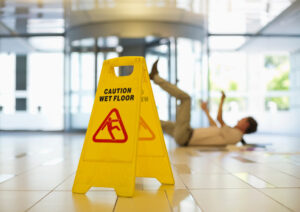When Is a Landlord Liable for Slip-and-Fall Accident in a California Apartment?
Posted in Apartment Accidents on July 23, 2024
Slip-and-fall accidents can happen anywhere, even in the seemingly safe environment of a California apartment. These accidents can result in serious injuries and costly medical bills for the victim. But who is responsible for these accidents? In some cases, the landlord may be held liable for the slip-and-fall incident. However, determining the landlord’s liability can be a complex process, as there are various factors that need to be considered.
At Soofer Law Group, we aim to help you understand these complexities and guide you through the process of establishing landlord liability for your slip-and-fall accident in California. Our experienced attorneys are well-versed in apartment premises liability cases and understand the intricacies of California’s liability laws. We work diligently to prove negligence on the part of the landlord and fight for your rightful compensation.
What Are the Legal Responsibilities of Landlords in California?
In California, landlords have a duty to ensure their properties are safe and habitable for tenants and visitors. This means they must regularly inspect the premises for any potential hazards and fix any issues promptly to prevent accidents, including slip-and-fall incidents. California law requires landlords to comply with state and local health and safety codes, which cover a wide range of standards, from structural integrity to proper sanitation.
Additionally, landlords must provide adequate warnings of any known dangers that cannot be immediately rectified. For instance, if there is a delay in repairing a broken stairway, the landlord must clearly mark the hazard to prevent accidents. Furthermore, landlords are responsible for maintaining common areas such as hallways, staircases, and outdoor walkways, and ensuring these areas are free of obstacles or conditions that might lead to a slip and fall.
Under What Circumstances Can a Landlord Be Held Liable for Slip-and-Fall Accidents?
Determining when a landlord is liable for a slip-and-fall accident involves assessing whether the landlord neglected their duty to keep the property safe. Liability often hinges on the concept of negligence. Specific conditions under which a landlord might be considered liable include:
- Neglected maintenance: If the landlord didn’t fix known issues or hazards that could lead to a slip and fall, such as a broken step or a leaky ceiling, they could be liable.
- Inadequate warnings: Landlords might be responsible if they failed to warn tenants and visitors about potential dangers that aren’t obvious, like a freshly waxed floor without a sign.
- Violating safety codes: If a landlord doesn’t follow local building or safety codes and this violation leads to a slip and fall, they could be held liable. This could be anything from not having proper railing on stairs to failing to ensure adequate lighting.
- Ignoring complaints: If tenants have previously reported a hazardous condition and the landlord didn’t take action to resolve it, this inaction could make them liable for any resulting accidents.
Understanding these circumstances can shine a light on the path to determining liability in a slip-and-fall case. If it can be proven that the landlord’s negligence directly resulted in the accident, the tenant could be eligible for compensation for medical bills, lost wages, and other damages.
What Evidence Is Needed to Prove Landlord Liability in Slip-and-Fall Cases?
To make a strong case against a landlord in a slip-and-fall incident, gathering solid evidence is key. First off, you and your attorney will want to collect photos or videos of the accident scene, showing the hazard that led to the fall. This could be anything from a wet floor without a caution sign to a loose carpet edge. Next, witness statements can add a lot of weight to your claim. If someone saw what happened or can testify to the hazard being there, their input can be invaluable.
Don’t forget to keep a record of your injuries and medical treatment. Medical reports, bills, and doctor’s notes are crucial in proving the severity of the accident’s impact on your life. Lastly, if you reported the hazard to your landlord before the accident and they did nothing about it, any emails, texts, or documented communications can be powerful evidence. Proving negligence in a slip-and-fall case hinges on showing the landlord knew about the danger but failed to act.
When Is a Landlord Liable for Slip-and-Fall Accidents in a California Apartment?
At Soofer Law Group, we understand that slip-and-fall accidents can have a serious impact on your life. Our dedicated team is committed to helping you navigate the complexities of landlord liability in California. We work tirelessly to establish the negligence of landlords and secure the compensation you deserve. With a track record of over 98% success in cases we accept, we prioritize your well-being and fight for your rights.
Our firm is known for handling a limited number of cases to ensure each client receives our full attention and resources. We challenge the tactics of insurance companies, ensuring you get fair treatment. We also work on a contingency fee basis, meaning you don’t pay unless we win your case. Contact us at (310) 861-4058 or through our contact form for a free consultation.
